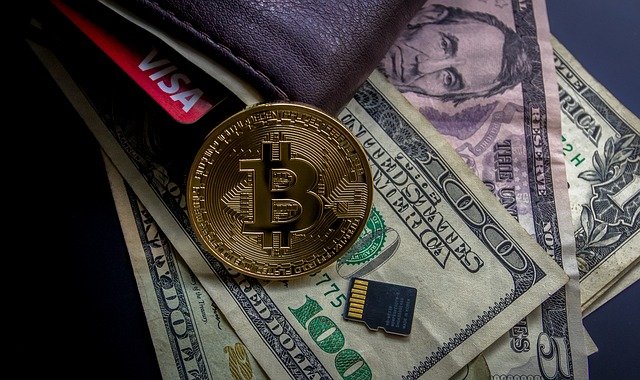Why Cryptocurrency Regulation Is Actually ‘A Good Thing’ for Investors, According to These Experts – NextAdvisor
Editorial IndependenceWe want to help you make more informed decisions. Some links on this page — clearly marked — may take you to a partner website and may result in us earning a referral commission. For more information, see How We Make Money.
Cryptocurrency regulation can be a controversial topic, but plenty of experts say crypto investors should welcome it.
For starters, more reg…….

We want to help you make more informed decisions. Some links on this page — clearly marked — may take you to a partner website and may result in us earning a referral commission. For more information, see How We Make Money.
Cryptocurrency regulation can be a controversial topic, but plenty of experts say crypto investors should welcome it.
For starters, more regulation could mean more stability in a notoriously volatile crypto market. “Regulations will come up and they have to come up at some point, which would stabilize the market even further,” says Tally Greenberg, head of business development at Allnodes, a platform that provides hosting, monitoring, and staking services. “That protects investors, so it’s a good thing. It’s not a bad thing.”
Still, many cryptocurrency enthusiasts fervently oppose new regulation. They say it would hinder innovation and goes against the spirit of cryptocurrency, which emphasizes decentralization at its core.
For these anti-regulation crypto enthusiasts, the decentralized nature of digital currencies — which, unlike traditional currencies, aren’t backed by any institution or government authority — is a big draw. So in this view, any new regulation would pose a threat to the decentralization that is a feature, rather than a bug.
New regulation also has the potential to protect long-term investors, prevent fraudulent activity within the crypto ecosystem, and provide clear guidance to allow companies to innovate in the crypto economy, according to Aaron Klein, a senior fellow in economic studies at the Brookings Institution, focused on financial technology and regulation. But forthcoming regulation will need to strike the right balance, he says.
“In reality, you kind of have three possibilities: no regulation, bad regulation, good regulation,” Klein says.
What’s Next In Crypto Regulation?
While a rise in mainstream adoption of crypto in 2021 led to a running debate on the role of the government in this largely unregulated sector, clear rules are still in development. This has left the industry guessing while thousands of tokens and digital currencies are introduced, and new companies and platforms emerge to help store and trade them.
“Policies haven’t been devised yet, because there’s no precedent to blockchain and crypto, so it’s a hell of a task,” says Greenberg. “I understand why people are stalling on it, but something needs to happen soon.”
Recent conversations on Capitol Hill suggest it’s not a matter of if further regulation is coming, but when. President Biden signed off on new crypto legislation related to taxes in the $1.2 trillion bipartisan infrastructure bill late last year. And the Federal Reserve is toying with the idea of issuing a U.S. digital currency.
The Fed released a long-awaited report in January exploring the costs and benefits of a government-issued digital currency. The report ultimately deferred a final decision on whether to move forward, and the Fed is giving the public and other stakeholders until May 20 to share their input before taking further action. Stablecoins are also a hot button topic, and many experts anticipate it will be the first type of cryptocurrency to be regulated.
While new regulation has the potential to bring more stability to the crypto market, it’s still a highly volatile and speculative investment. That’s why financial experts advise most investors to keep crypto holdings to under 5% of their portfolios, and never to invest in crypto at the expense of saving for emergencies or paying off high-interest debt.
Why Crypto Regulation Would Be Good for Investors
We asked experts for their take on the changing crypto regulatory landscape. Here’s why they say more regulation would be a good thing for long-term crypto investors.
1. More Stability in the Market
Regulating cryptocurrencies could be a healthy development for the industry, at least where everyday investors are concerned. Greater regulatory guidance, if well targeted, could help reduce speculation among crypto assets. Less speculation can lead to higher investor confidence, which could draw in more long-term investors who have so far said no thanks to a highly speculative, volatile crypto market.
“Even if it doesn’t bring more people in, it may change people’s current behavior,” says Klein. Enthusiasts claim there are a lot of benefits cryptocurrency has over fiat currency and other asset classes, but those benefits can only come to full fruition “if an appropriate regulatory framework is put into place,” according to Klein.
It’s hard to predict how the price-sensitive asset class will react to regulation over the long term, since it’ll depend on whether the U.S. government takes a more lenient or stringent approach. In the short term, any new regulation could inspire knee-jerk investor reactions to the markets, suppressing the trading values of cryptocurrency. For example, when China banned cryptocurrency transactions in September 2021, cryptocurrency markets dropped. But over the long term, regulation may have the potential to stabilize the market and reduce some risk for cryptocurrency investors, says Greenberg.
To be clear, new regulation could slow the roll of those trying to get rich quick by predicting the next coin that goes “to the moon,” she says. But that’s a good thing for long-term investors.
“Slowly but surely, we are not only being massively adopted as an industry, we’re also stabilizing more or less. Regulation will stabilize the market even further,” says Greenberg
2. Increase in Investor Protection and Confidence
Crypto investors currently have little to no protection in the market, as there is no regulatory framework in place to ensure protection of assets.
Some exchanges maintain compliance with evolving federal and state regulators in the United States. This includes many established, high-volume U.S.-based exchanges, like Coinbase and Gemini, but they’re not regulated similarly to public stock exchanges or alternative trading systems. That can be problematic, according to Timothy Massad, former chairman of the Commodity Futures Trading Commission and a senior fellow at the Kennedy School of Government at Harvard University.
“Most of the trading that goes on in the crypto world today is not regulated by any federal authority, and that’s a big gap,” says Massad. “That means that investor protection is much, much weaker on these big exchanges than it is in our securities markets or our futures market.”
That’s why regulation is needed to make the market safer, says Klein. Crypto will still likely be a risky investment, like individual stocks, but investor protections could make the market less vulnerable to outside manipulation. Safer markets can lead to more investor confidence, which often means greater value over time.
“[Regulation] is important for investor confidence. It’s important for basic fairness, and ultimately it’s important for the industry to grow,” says Klein.
3. Safer Crypto Ecosystem
Crypto has been described as the “Wild West” by SEC chair Gary Gensler due to lack of regulation in the industry. The lack of laws and policies over this burgeoning area has created an opening for widespread fraud, scams, rug pulls, and market manipulation.
“Crypto isn’t subject to requirements to prevent fraud manipulation. It’s not subject to standards on conflicts of interest,” says Massad. “My point is simply that we don’t have the same kind of standards that we have in other markets. Today, that means buyer beware, essentially.”
Crypto crime has grown tremendously over the last two years. Scammers took $14 billion worth of crypto last year, a record compared to the $7.8 billion taken by scammers in 2020, according to a report by blockchain data firm Chainalysis. And there are more than 17,000 altcoins, which are typically even more volatile and speculative than Bitcoin, and come with a higher risk of crypto scams and frauds. Even the most advanced and enthusiastic cryptocurrency experts understand there are many new and evolving risks in the world of crypto right now.
But there are several ways to protect your crypto. For starters, watch out for some common red flags that are similar to classic money wiring scams and credit card fraud, like obvious misspellings in emails or social media posts, promises to make you rich, or even large-scale social media crypto schemes known as rug pulls.
To protect your digital wallets from hackers, practice good digital security habits such as using a hot or cold wallet for extra safety or keeping your crypto in an exchange with robust security. It’s also extremely important to keep track of your wallet key and not show it to anyone. Losing your key or having it stolen could mean losing your crypto altogether.
“As much as I like the decentralization and the lack of government [involvement], I am glad that they are paying attention, because unfortunately with cryptocurrency, there are a lot of scams,” Kiana Danial, author of “Cryptocurrency Investing for Dummies,” recently told NextAdvisor.
Source: https://time.com/nextadvisor/investing/cryptocurrency/why-crypto-regulation-is-good-for-investors/







